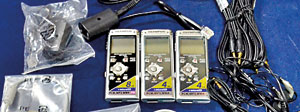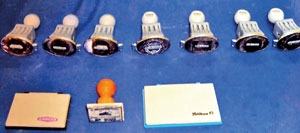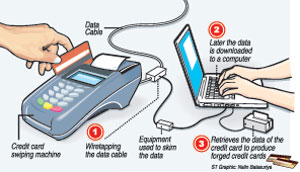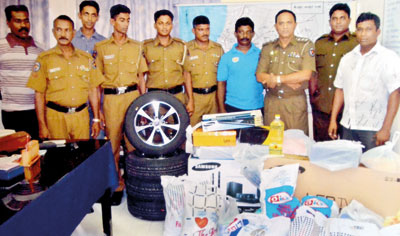An organized ring that copied credit card data from swiping machines at supermarkets, for the first time using a mobile phone sized recorder, for cloning and fraudulent use has been busted by the police.
 |
| Equipment recovered from the gang |
 |
| Rubber seals similar to the ones used by the Immigration and Emigration Department |
 |
Their modus operandi was to link a swiping machine by a cable to a data recorder surreptitiously. Police say this is the first time such a piece of equipment has been found in Sri Lanka.
Thereafter, the data had been retrieved and forged-credit cards manufactured and used to procure goods, the police have found. As investigations continue, the extent of the widespread racket is unfolding.
The masterminds behind this operation have been a Sri Lankan, a Maldivian and a Malaysian, Police said yesterday. The trio had even recruited youth and found them employment in some supermarkets so they could steal credit card data using the new equipment, Police said.
“Credit card frauds are on the rise. The cloning of cards is a new trend,” a police officer told the Sunday Times. He said, “a few groups” were operating in the country and warned credit card holders to be cautious. A special police team is now investigating the fraud.
Police stumbled on this racket after the Negombo Police conducted a chance check on a shop a postal worker had set
up in his house.
He had sold electronic items including television sets, DVD players and music systems. The growing merchandise at this shop had aroused suspicions of the villagers since they found that the postal worker in question could not afford to market such items with his meagre income.
On information, Negombo Police Crimes section Officer in Charge, Subash Priyadarshana, conducted a search. They checked the items on sale and from where they had been obtained. It came to light that most items had been purchased using credit cards. Sub Inspector D.S. Wickremesinghe who was also involved in the raid told the Sunday Times, “on further scrutiny, we found that the postal worker had two National Identity Cards with different names. We also found ten different credit cards issued by foreign banks.
The postal worker confessed that the credit cards had been given to him by a former security guard attached to the Airports Authority. This person, a resident of the same area, was later arrested. On questioning, he said he had been given the credit cards by a businessman in Peradeniya. The businessman was arrested at his Bambalapitiya apartment and he confessed that a Malaysian had given him the cards.
 |
| The police officers who busted the racket showing the items they took into custody. Pic by Hasitha Kulasekera |
It turned out that the Malaysian was decoding the data from the mobile phone sized recorder and cloning forged credit cards. Police also found in the businessman’s possession 16 forged credit cards carrying the names of local banks.
Police are probing other rackets carried out by the ring after they found 10 National Identity Cards with Tamil names, 15 forged visa stickers to West Asian countries and forged rubber stamps resembling those used by the Department of Immigration and Emigration.
The postal worker, Lakshan Asiri (34), security guard Philip Fernando, businessman Shantha Chandrapala, Malaysian national Bin Hashim, Maldivian national Mohamed Zafraz (described as an exporter of garments) have been remanded. |





